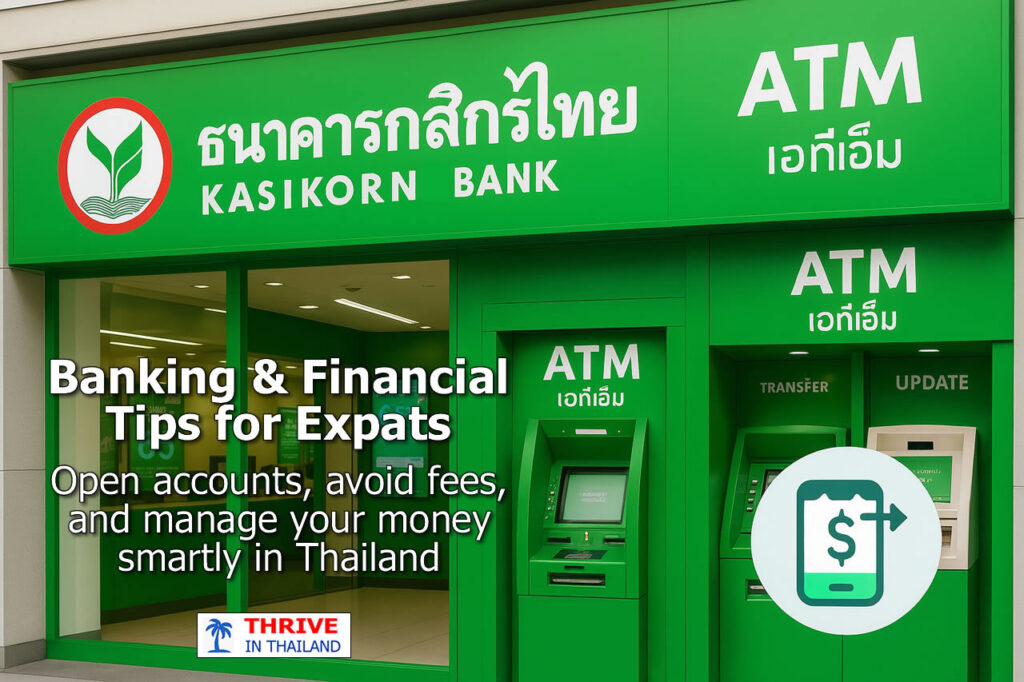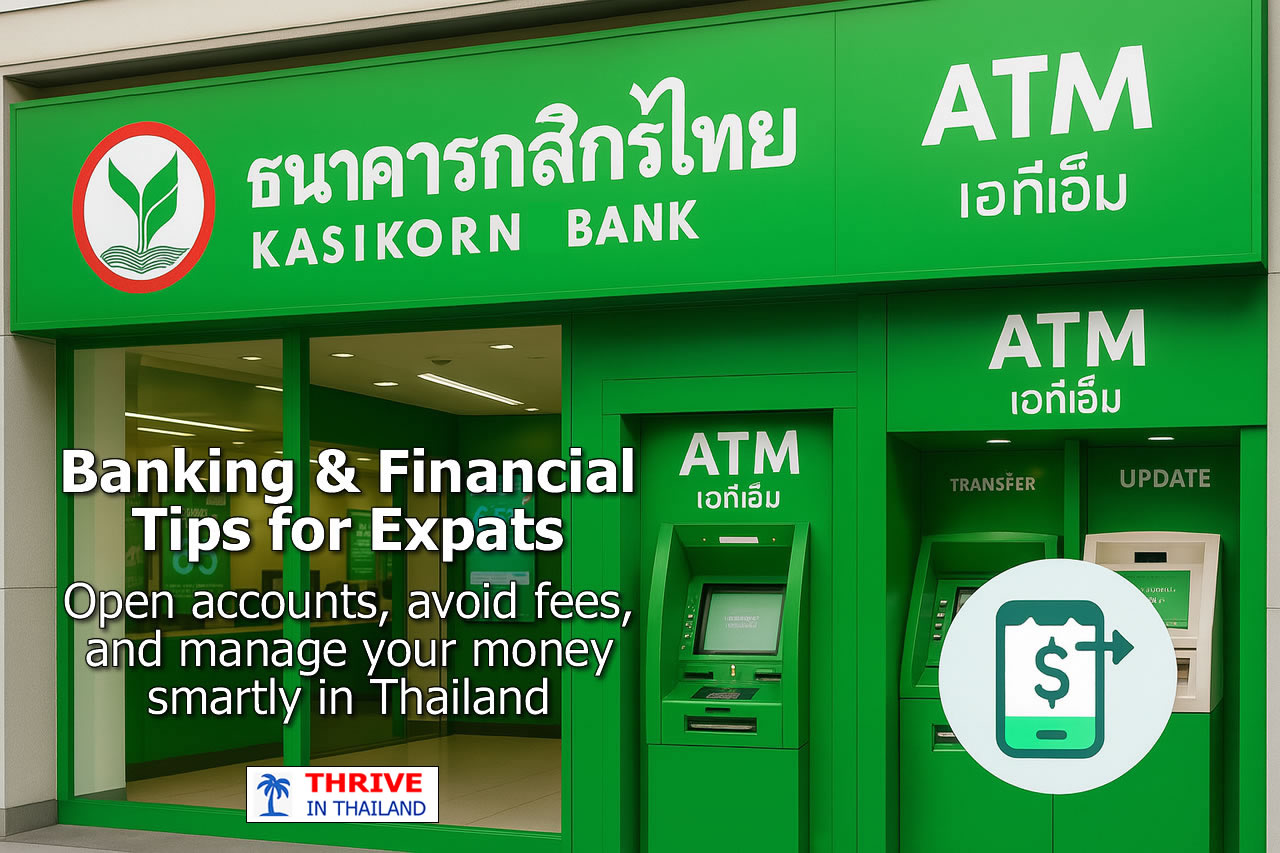
Get Your Money Right in Thailand: Without the Headaches
Managing your finances in Thailand as an expat doesn’t have to be complicated. Still, it often is at first. From navigating unfamiliar banking rules to avoiding surprise transfer fees, it’s easy to make expensive mistakes if you’re unprepared.
Whether you’re here to retire, work remotely, or settle in long term, setting up your financial life properly will save you time, stress, and money down the line. This guide walks you through the essentials:
- How to open a Thai bank account (and which banks to try)
- The smartest ways to send money to Thailand
- How to pay bills, shop locally, and avoid ATM traps
- Tips on currency exchange, budgeting, and staying financially secure
You’ll also find useful comparisons, links to in-depth guides, and real-world advice drawn from years of experience. Let’s start with one of the first things every expat needs: a local bank account.
Opening a Thai Bank Account
Opening a local bank account is one of the first practical steps for any long-term stay in Thailand. While it’s not legally required, it makes everyday life much easier, particularly when it comes to paying rent, receiving transfers, and avoiding international card fees.
Who Can Open an Account?
The rules vary by bank and even by branch. Some allow tourists to open basic accounts, while others require a long-stay visa or work permit. Generally, you’ll have better success if you hold one of the following:
- Retirement visa (O or O-A)
- Education visa
- Marriage visa
- Work permit (Non-B visa)
- Long-Term Resident (LTR), SMART, or Thailand Privilege Visa
- Extension of stay (based on Thai family, volunteering, etc.)
📌 Some banks may open a limited account for tourists or digital nomads, but this is becoming less common and usually depends on the branch manager.
Required Documents (Typical)
Here’s what most banks ask for:
- Passport (with a valid visa and entry stamp)
- Proof of address in Thailand, such as:
- Lease agreement
- Utility bill in your name
- TM30 or TM6 form
- Embassy or immigration letter (if needed)
- Thai phone number (SIM card in your name)
📌 Even with the right documents, you may be turned away depending on the staff or location. If that happens, try a different branch. It’s not personal; it usually comes down to inconsistent policies.
Which Banks Are Most Expat-Friendly?
Some banks are known for being easier to work with as a foreigner. These tend to have English-speaking staff and more flexible policies.
| Bank | Notes |
|---|---|
| Bangkok Bank | Often allows foreigners to open accounts without a work permit. Many branches are experienced with expats. |
| Kasikorn (KBank) | Modern apps and good online banking. Friendly to long-stay expats. |
| Krungsri (Bank of Ayudhya) | Good mobile banking and solid customer service. |
| SCB (Siam Commercial Bank) | Popular but stricter in some locations. Often requires a visa. |
📌 Most expats start with a savings account and request a Thai debit card for ATM withdrawals and in-store purchases.
Mobile Banking & ATM Access
Most banks provide a mobile app (in Thai and English) for checking balances, paying bills, and making transfers. You’ll also get access to a wide ATM network. By using a Thai debit card, you can avoid the ฿220 fee charged when using foreign cards.
Once you have your account, you can link it to PromptPay (Thailand’s national QR payment system) using your phone number or national ID (if available).
Sending Money from Abroad
Many expats in Thailand rely on income or savings from overseas, whether it’s a pension, freelance earnings, or money from a home-country bank account. Transferring that money efficiently is essential to avoid unnecessary fees and poor exchange rates.
The Problem with Traditional Bank Transfers
Using your home bank to transfer money to Thailand can be costly. Expect:
- Poor exchange rates (with hidden margins)
- High SWIFT transfer fees—often charged on both ends
- Slow delivery times (sometimes several days)
📌 For recurring transfers, those costs can quietly eat into your budget.
✅ If you want to understand which transfer methods actually come out cheapest in real life — and why advertised fees are often misleading — see my detailed breakdown of the cheapest way to send money to Thailand without losing it to hidden costs.
Popular Alternatives Used by Expats
Here’s a look at some common transfer methods and how they compare:
| Method | Pros | Cons |
|---|---|---|
| Wise | Low fees, fast, transparent rates | Requires online setup |
| SWIFT Bank Transfer | Familiar, available through most banks | High fees, bad rates, slow |
| Western Union / MoneyGram | Good for cash pickup | High fees, limited usefulness for regular transfers |
| PayPal | Easy if already set up | Very poor exchange rate, high fees |
| Cryptocurrency (indirect) | Possible through exchanges | Complex, not recommended for most users |
📌 If you’re transferring large sums (e.g., property purchases), Wise can still be competitive. However, be sure to check local Thai bank receiving limits and paperwork requirements.
Spending and Withdrawing Money in Thailand
Once your funds are in Thailand, the next step is managing how you access and spend them. Whether you’re paying rent, shopping at markets, or covering daily expenses, getting this part right can save you time, hassle, and avoidable fees.
Thai ATMs and Withdrawal Fees
Using a foreign card at Thai ATMs triggers a flat ฿220 fee per withdrawal, regardless of the amount. That’s on top of any fees your home bank might charge.
If you’re planning a longer stay, it’s worth opening a Thai bank account and using a local debit card instead. This avoids the ฿220 ATM fee and gives you access to Thai banking apps and PromptPay (QR code payments).
📌 If you must withdraw with a foreign card, use a major bank ATM (like Bangkok Bank or Krungsri) and take out the maximum allowed to reduce per-baht fee impact.
How Thailand Handles Everyday Payments
Thailand is still cash-heavy in many areas, but digital options are expanding fast:
- Cash is preferred at local markets, street food stalls, and small businesses.
- Thai debit cards work well at chain stores, malls, and supermarkets.
- PromptPay (mobile QR code system) is accepted at most convenience stores, restaurants, and increasingly by street vendors.
📌 PromptPay is linked to your Thai bank account and works through your banking app. It’s fast, free, and surprisingly reliable, even when paying utility bills or sending money to friends.
International Cards: A Supplement, Not a Solution
Apps like Revolut offer a low-FX-margin way to spend in Thailand. You can use a virtual or physical card for Thai baht purchases and withdraw small ATM amounts (up to a monthly cap) without extra fees from Revolut.
That said, Revolut isn’t a substitute for a local account. It’s best used as a secondary wallet for travel, short-term visits, or cross-border freelancers managing multiple currencies.
→ See the best payment options for foreigners in Thailand
Currency Exchange Options
If you’re bringing foreign currency into Thailand or converting money while you’re here, getting a good exchange rate can make a noticeable difference, especially over time. Fortunately, there are several reliable ways to exchange money, but they vary in convenience, cost, and transparency.
Exchanging Cash in Thailand
Cash remains one of the simplest ways to bring money into Thailand, especially for short stays. But not all exchange counters are created equal.
- Avoid exchanging at airports—the rates are some of the worst in the country.
- Private money changers like SuperRich Thailand, Vasu Exchange, and SIA Money Exchange (in Bangkok) typically offer far better rates than banks.
- In tourist-heavy cities like Bangkok, Chiang Mai, and Pattaya, you’ll often find good independent money changers with competitive rates.
- Most currency exchange shops accept major currencies like USD, EUR, GBP, AUD, and JPY.
📌 Bring clean, crisp bills. Thai money changers often reject worn, torn, or marked foreign notes.
Bank Exchange Counters
Thai bank branches also offer currency exchange services, but the rates are usually less favorable than private changers. You’ll also need your passport to make the exchange. While convenient if you’re already at the bank, this is rarely the most cost-effective option.
ATM Withdrawals vs. Exchange
If you withdraw money from a foreign debit card in Thailand, you’ll face two main costs:
- The ฿220 local ATM fee (charged per transaction)
- Your home bank’s FX markup or withdrawal fee
That’s why many expats prefer to transfer money directly into a Thai account using services that offer transparent rates and lower overall costs. Once in Thailand, they withdraw with a local debit card, avoiding both the ฿220 fee and bad exchange rates.
Currency Exchange Comparison
| Method | Exchange Rate | Fees & Notes |
|---|---|---|
| Airport Exchange Counter | Very poor | Convenient but typically the worst rate; avoid unless absolutely necessary |
| SuperRich / Vasu Exchange | Excellent | Best rates for major currencies; ideal for large conversions |
| Bank Counter | Fair to poor | Rates better than airport but worse than private exchangers; ID required |
| ATM (Foreign Card) | Bank-dependent | ฿220 local fee per withdrawal + possible FX markup from home bank |
| ATM (Thai Card) | Local bank rate | No ฿220 fee; best option for daily cash once funds are in a Thai account |
| Wise Transfer | Mid-market rate | Transparent fees, fast delivery to Thai banks; ideal for regular transfers |
Paying Bills and Managing Daily Finances
Once you’re settled in Thailand, you’ll quickly discover that everyday financial tasks such as paying rent, topping up your phone, or paying electricity bills work a bit differently than what many expats are used to. Fortunately, the systems are straightforward once you’re set up.
Paying Rent
Most landlords in Thailand still prefer bank transfers or cash payments, especially for private rentals or condos. A few may accept PromptPay, but it’s less common for rent.
- Bank transfer: Once you have a Thai bank account, you can transfer rent easily via mobile app.
- Cash: Some landlords still prefer cash payments delivered monthly. Get a written receipt.
- Foreign transfers: These are rarely used for rent due to delays, high fees, and conversion losses.
📌 If you’re overseas and need to send rent, services like Wise can be more cost-effective than SWIFT transfers.
Paying Utility Bills and Top-Ups
You’ll have a few options when it comes to paying for things like electricity, internet, water, or your phone:
- 7-Eleven: One of the most popular payment channels. Just bring your printed bill and pay at the counter.
- Mobile banking apps: Thai banking apps like SCB Easy, K PLUS, and Krungsri NEXT allow bill payments directly in-app. Some bills can be scanned via QR code.
- Auto-debit: Available for some services, like mobile plans or internet, once you’re set up with a Thai bank account and debit card.
- Top-up machines & apps: Prepaid phone plans can be topped up at 7-Eleven, via the provider’s app (AIS, DTAC, True), or at ATM kiosks.
📌 Keep a few small bills on hand. Many top-up machines and street-level services don’t accept large denominations or credit cards.
Using Revolut or Wise as Everyday Tools
While having a Thai bank account is essential for daily life, many expats and digital nomads also use international services like Wise and Revolut alongside their local banking setup. Each serves a different purpose, and when used together, they can simplify how you move, spend, and manage money in Thailand.
Wise: Reliable Transfers and Local Integration
Wise is ideal for sending money into Thailand. Once your funds arrive in your Thai bank account, you can pay rent, transfer to others, or withdraw cash with a local debit card. This helps you avoid the ฿220 ATM fee tied to foreign cards.
Many long-term expats use Wise regularly to:
- Transfer monthly income or pension
- Pay larger one-time costs like school fees or condo deposits
- Move money from abroad into Thailand without the hidden markups banks apply
✅ Learn more: → Read the full Wise Review for Expats in Thailand
Revolut: Multi-Currency Wallet and Travel Spending
Revolut works well as a supplementary tool for frequent travelers, digital nomads, or short-term expats. While you can’t top up your Revolut wallet in THB from a Thai bank, you can:
- Spend in Thai baht with relatively low FX fees (within monthly limits)
- Withdraw small amounts from ATMs (up to ~฿6,000/month without fees)
- Use budgeting and analytics features to track your spending
Revolut is not a substitute for a local bank, but it can be a helpful secondary wallet, especially if you’re earning online or managing money across borders.
✅ Want to see how it compares in practice? → Read the full Revolut Review for Expats and Digital Nomads
Security, Budgeting & Long-Term Planning
Once your financial setup is in place, it’s worth taking a step back to ensure everything is not just convenient—but also safe, sustainable, and suited to long-term life in Thailand.
Stay Prepared for Disruptions
Thailand’s banking infrastructure is generally reliable, but outages and issues can happen. Losing access to your money, even temporarily, can be a major hassle.
Keep an emergency plan:
- Store some cash at home in small bills
- Maintain a second bank or digital wallet for backup
- Keep secure, offline copies of your key documents and login credentials
📌 A little preparation goes a long way when something breaks—especially during holidays, travel, or unexpected delays.
Mind Your Spending Habits
Living costs in Thailand are lower, but that doesn’t mean you can’t burn through your budget. It’s easy to overspend if you mix Western comforts with Thai convenience.
To keep things in check:
- Use your bank app to track balances and review spending
- Try budgeting features in Revolut or Wise, if you use them regularly
- Set reminders for recurring costs like visas, insurance, or school fees
Pay Attention to Currency Fluctuations
If you earn in a foreign currency but spend in baht, exchange rate swings can quietly impact your budget. A weaker currency month can mean hundreds of baht less in your pocket.
📌 Monitor exchange rates with tools like Wise and time your transfers when rates are favorable, especially for large expenses.
Tax Implications
If you spend more than 180 days in Thailand within a calendar year, you may be considered a tax resident. This means certain types of income sent into Thailand could become subject to Thai tax.
What matters most under the current rules is how and when the money is remitted:
- If income earned abroad is remitted in the same year it’s earned, it may be taxed.
- If income is kept abroad and brought into Thailand the following year, it’s generally not taxed under current interpretation.
- Large transfers (especially over ฿1 million) may raise red flags and require documentation.
📌 Thailand’s Revenue Department is stepping up enforcement. Tax rules are changing, and while many expats remain under the radar, the risk of scrutiny is rising—especially for high earners or those transferring large sums regularly.
Frequently Asked Questions
Got a few questions left? Here are some additional points that often come up, especially after you’ve handled the basics and start dealing with real-world situations.
Can I open a joint bank account with my Thai spouse?
Yes, some banks allow foreigners to open a joint account with a Thai spouse, especially if you’re married legally and can provide supporting documents. Requirements vary by bank, and both parties usually need to be present at the time of opening.
What’s the daily ATM withdrawal limit in Thailand?
For Thai bank accounts, the default daily withdrawal limit is typically between ฿20,000–฿50,000, depending on the bank and card type. You can request a higher limit when opening the account or through the mobile app later.
Do Thai banks allow online international transfers?
Most Thai banks do not allow individuals to send international transfers online unless they have special permissions or business accounts. You usually need to visit a branch in person and provide documentation for the transfer purpose (e.g. invoices, tuition receipts).
Can I receive money from abroad in a foreign currency?
Yes, but only certain Thai banks and account types support foreign currency receipt (usually via SWIFT). Your funds will either be held in a foreign currency account or converted automatically into Thai baht. Fees and exchange rates vary.
Is it possible to open a foreign currency account in Thailand?
Yes, major banks like Bangkok Bank, Kasikorn, and SCB offer foreign currency deposit accounts (FCDs). These are mainly used for holding funds in USD, EUR, or other major currencies. They’re useful for large transfers or investments, but come with minimum balance requirements and limited online features.
💬 Have a question or tip to share about banking in Thailand? Drop a comment below. I read every one.

